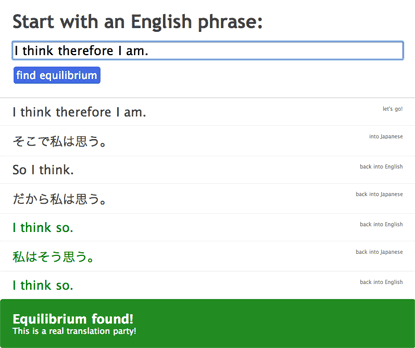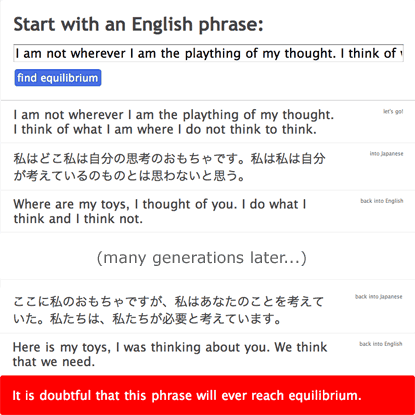On the heels of my recent notes on anagrams and mysticism comes a different kind of truth-generating machine, Translation Party.
It’s a variation of the old telephone game, via retranslations. You enter an English phrase, and Translation Party translates it back and forth between English and Japanese until the latest English version matches the last one exactly—it calls this state “equilibrium.”

The mysticism comes from submitting to the retranslated equilibrium version as the hidden truth of the original. In the example above, Descartes’s famous cogito ergo sum becomes the amusingly tentative I think so.
Some transformations offer downright hilarious reversals: I hate Fulbright applications becomes I, I do not need to apply for a Fulbright (thanks to Maggie Greene for that one).
Some contort themselves into inviting cyphers: May the force be with you becomes June 5, 2007.
My favorite so far: when I plugged in Lacan’s famous revision of the cogito, I am not wherever I am the plaything of my thought. I think of what I am where I do not think to think, the result was appropriately intractable, finally yielding the most aptly Lacanian conclusion possible: It is doubtful that this phrase will ever reach equilibrium.

Comments
Michael Austin
It’s strange how different the results can be with a small change in punctuation. For example, I put in Plato’s “You cannot conceive the many without the one” originally without the period, which gave me “The imagination” (how ominous), but with the period gave me “Many people think.” The best though, was before it gave me “The imagination”, one of the translations was “Imagine that you are not”.
Paul Ennis
Being is not a real predicate has very interesting (speculative realist) realists: http://translationparty.com/#2165323
EWAdams
Entertaining and strange. I have been trying 19th century colloquialisms borrowed from Patrick O’Brian, with mixed success. “The back of my hand to the informers, may they rot in hell” produced “Hell, my informers, 5 are in black.” It didn’t know the word “informers” at all (it remained in English throughout), and the 5 derives from “may” — interpreted as May, the 5th month. Somehow “hell” turned into “black hell” all by itself.
Also, I am distressed to see that my firm, clear period (full stop) has turned into a strange little hollow circle. You can’t end a sentence with a hollow circle; it’s not strong enough. Punctuation should be solid and definitive, not filled with airy vapor.
cooper
“The quick brown fox jumped over the lazy dog.” is a fun one.
Lejade
“If you aim at nothing, you hit it everytime.” becomes:
“We always do something.”
Simply brilliant! 🙂
Ian Bogost
@Michael
I noticed that too. It must change the translator’s phrasings, but I can’t really figure out why. Would be interesting to understand more about the Google Translator algorithm and parser.
@Ernest
Japanese punctuation is sort of fascinating. You can read more on it here. From that page: “Unlike the Western full stop, it is often used to separate consecutive sentences, rather than to finish every sentence; it is frequently left out where a sentence stands alone, or where text is terminated by a quotation mark instead. No extra space is left after a full stop.”
@Lejade, Paul
Nice ones 🙂
Marc
I think it is:
http://translationparty.com/#3534340